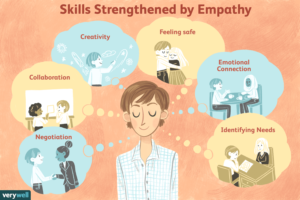Empathy and love both seem to be related to oxytocin. Dr. Zak thinks this is why we want to hear those sad love songs over and over. There is a soothing to sadness. Remember that when suffering moves us to engage with others then we get the pleasure and reduction of anxiety from the HOME system. Helping others is important to humans. He recalls last time one of his daughters had the stomach flu and he stayed up with her all night while she vomited and at one point she apologized to me. Dr. Zak told her he couldn’t think of a more important thing to do than hold the bucket and be with her. It was her suffering that moved him to help her, even though he, too, suffered with her, he felt good that I could help her.
Everything we do draws on our metabolic resources though oxytocin synthesis is metabolically cheap so we can’t love too much. Actually, eating mildly stimulates oxytocin release so that’s why we take dates (and hold meetings) at meals–it makes it easier to connect to someone.
The more oxytocin is released, the lower the threshold for its release. In other words, the more we love, the more we can love. My research has shown that those who release the most oxytocin after being trusted are happier in their lives. They are happier because they have better relationships of all types: romantic, with family, they have more close friends, and are even kinder to strangers. We’ve also shown that oxytocin release improves the immune system by reducing stress. So, love freely!
Dr. Zak recently studied loving kindness (metta) meditation and compared this to mindfulness meditation. This was for people who had never meditated before and received a month of training. Both kinds of meditation lead to greater altruism, but metta did this to a greater extent. Metta meditation was more valuable to those who received it than mindfulness meditation, and the metta group had a larger reduction in brain activity in regions associated with anxiety and self-focused attention than the mindfulness group did.
Oxytocin receptors live in areas of the brain associated with social memories (animals that cannot produce oxytocin get “social amnesia”). So, we are laying down memory tracks using oxytocin on who is safe, trustworthy, and kind. These memories are being rehearsed each time we have a positive interaction and so it can lead to us being kinder to more people more of the time. Practice is the key to activate this effect.
Based on what was previously mentioned one can make a habit of practicing loving-kindness, so that it seems to come naturally and automatically in your personal interactions. Also is seems that oxytocin circuit work below the level of conscious awareness.
Psychopaths just don’t feel the empathy, the love, and are permanently in selfish, survival mode.
One of the potent inhibitors of oxytocin release is stress, and one of those stresses is survival stress…If your body is not facing survival stress, then you sort of have the luxury of connecting to others. That connection is always costly in time or resources and not everyone can do that. All of us don’t do it all the time. As average incomes rises, there’s a pretty strong gradient of better behavior occurring on average.
Research increasingly supports the long-held belief that kindness is good not only for others, but also for ourselves. While religions have also taught the importance of kindness for millennia, we see that kindness is not a religious matter; it is a basic human value. It belongs to what both the Dalai Lama and the World Happiness Report have called a universal secular ethics.
Kindness has layers of complexity even at a conceptual level. If someone asks for something that might be harmful for them, for instance an alcoholic asking for a drink, is it kind to give it to them? Which economic policies or political agendas are the kindest? When does kindness to oneself mean pushing past one’s pre-conceived limits and when does it mean giving oneself a much-needed break?
If we look at these complex questions, we can see that kindness is supported by discernment and by empathy. In some cases, you may want to be kind to someone, but because of a failure to understand their perspective or resonate with them emotionally, you may end up saying something hurtful or insensitive.
Naturally, kindness is also supported by compassion. If you are inclined to wish another person to be happy, protected and relieved of suffering–in other words, if you are compassionate towards them–you will not want to harm them. In such a case, your actions towards them are more likely to be characterised by kindness.
From this, we can see that the cultivation of many other skills and dispositions–such as compassion, empathy and discernment–will enhance kindness. Since kindness is vital for us on both biological and social levels, we should invest in methods that help us cultivate kindness as well as the skills and dispositions that support it. This includes introducing the science, theory and practice of kindness in educational settings so that children can benefit from this knowledge and can begin the practice of self-care and care for others from an early age.
In order to have a fully formed capacity for kindness, one must first learn to be kind to oneself and practice self-compassion. When we are not emotionally aware or are unkind towards ourselves, it is very difficult to be kind to another. Learning to have greater self-compassion can put us in the right physiological, emotional and mental state to be kind to others.
We have established that kindness is supported by related skills and dispositions, such as forgiveness, empathy, compassion and discernment. Further, to develop kindness for the greatest number of people, these practices should rest on a foundation of impartiality, where we learn to see our common humanity. In other words, we must realise that what all human beings have in common vastly outweighs our differences, and that all human beings naturally seek to experience greater well-being and less suffering.
What do you think?


